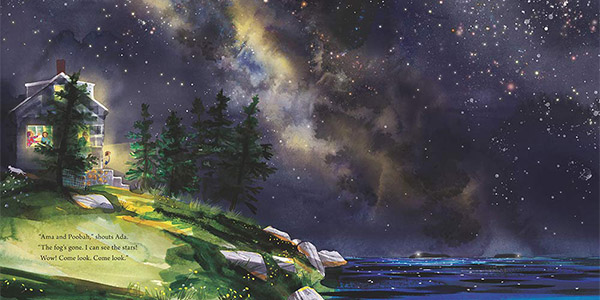SAID AND DONE
SEPTEMBER 2021
MIT SCHOOL OF HUMANITIES, ARTS, AND SOCIAL SCIENCES
QUOTABLE
“The reality at the core of documentary makes it an ideal lens for understanding our representational conventions. Mastering those conventions, and at times strategically breaking them, enables documentary not just to interpret the world, but to change it.”
— William Uricchio, Professor of Comparative Media Studies
SHAPING THE FUTURE OF STORYTELLING

From A Father’s Lullaby, an immersive work by OpenDocLab fellow Rashin Fahandej. Photo: Aram Bogosian
OPEN DOCUMENTARY LAB
Transformative truth-telling at the OpenDocLab
Witness, invention, inclusion, truth-telling, and dazzling media: The Lab's artists and technology scholars, based in the Comparative Media Studies program, are exploring representation and reality — and shaping the future of storytelling. A major function of the lab is making space for marginalized storytellers to take agency of how their own stories are told.
Story by MIT SHASS Communications
_______________________________

1908 postcard, New 95th Street Bridge; Southeast Chicago Archive & Storytelling Project
ANTHROPOLOGY
The Southeast Chicago Archive & Storytelling website | Walley, Boebel, Soyk
This innovative online archive of stories, photos, films, and beloved artifacts from the Southeast Chicago industrial community is a window on a neighborhood that was home to the largest industrial corridor in the world. The website project, a labor of love and scholarship, sparks insight for a national conversation about the nature of work, the value of community — and the future of America.
Explore the website | Interview with Christine Walley | Related: Exit Zero
_______________________________

A pagespread from Ada and the Galaxies; illustrations by Susanna Chapman
WRITING
Stargazers rejoice! | Alan Lightman, Olga Pastuchiv, Susanna Chapman
In Ada and the Galaxies, Lightman, MIT Professor of the Practice of the Humanities, and his creative colleagues evoke a sense of wonder about the interconnectedness of the natural world. Lightman's first book for children is also the first-of-its-kind collaboration between a university press and a children’s book publisher.
About the book, at the MIT Kids Press | Story at MIT News
MAKING A JUST SOCIETY

KNIGHT SCIENCE JOURNALISM AT MIT
Why are Black Americans wary of nature activities? What is the remedy?
Black outdoorsman Kanzangu writes that "the collective hesitancy of Black Americans to experience outdoor spaces [is] a justifiable response to historical circumstances." Kanzangu offers remedies to help make America's lands, waters, forests, mountains, and seashores inviting and safe for Black Americans.
Story at Undark Magazine | Outdoor Afro | Video: Outdoor Afro on Redwoods
CENTER FOR INTERNATIONAL STUDIES
Announcing the Human Rights & Technology Fellowship 2021-2022
The program, which supports students’ research and other activities, is intended to produce new knowledge about the relationship between human rights and technology—i.e., how technology can enhance, or impede, human rights. Fellows will receive $2,000 to pursue their research proposal. Apply by 25 October 2021 at 5pm.
Full fellowship guidelines
Making A Just Society
Ongoing Series
INTRODUCING FRENCH+

GLOBAL LANGUAGES
Announcing French+ | A new French & Francophone initiative at MIT
Launched this month at an event attended by Philippe Etienne, Ambassador of France to the United States; Arnaud Mentre, French Consul General in Boston; and other guests, the French+ initiative promotes local and international collaborations via an array of programs, including: the MIT Global France Seminar, cultural events, teaching exchanges, an Arts Sponsorship, a Visiting Professorship, and a cultural immersion trip for MIT students in France and Belgium. The curriculum offers opportunities to all students and classes to about 300 students annually, including majors, minors and concentrators.
Explore French+
THE FUTURE OF WORK

ECONOMICS | LABOR AND AUTOMATION
Study: As a population gets older, automation accelerates | Acemoglu, Restrepo
“'Demographic change — aging — is one of the most important factors leading to the adoption of robotics and other automation technologies,' says economist and Institute Professor Daron Acemoglu. The study finds that when it comes to the adoption of robots, aging alone accounts for 35 percent of the variation among countries. Within the U.S., the research shows the same pattern: Metro areas where the population is getting older at a faster rate are the places where industry invests more in robots. Acemoglu and Restrepo are continuing to research the effects of AI on the workforce, and the relationship between workplace automation and economic inequality."
Story by Peter Dizikes, MIT News | Paper: Demographics and Automation
EXPLORE
Follow us
Subscribe to Said and Done
10 issues a year
Media + Awards Digest
Current coverage
Making a Better World
Browse 12 Research Sectors
Making a Just Society
Explore the Resources
Solving Climate
Browse the Commentaries
Perspectives for the Pandemic
Explore the Series
Ethics, Computing, and AI: Perspectives from MIT
Full Series
Computing and AI: Humanistic Perspectives from MIT
Full Series
MIT Climate website
A major source of research, innovation, and discussion
Join us!
SHASS on MIT News
Research and Features
MIT Campaign for a Better World
Story | Join Us
Published by SHASS Communications
Office of the Dean, MIT School of Humanities, Arts, and Social Sciences
Editor and Designer: Emily Hiestand
Publication Associate: Alison Lanier
Published 15 September 2021





